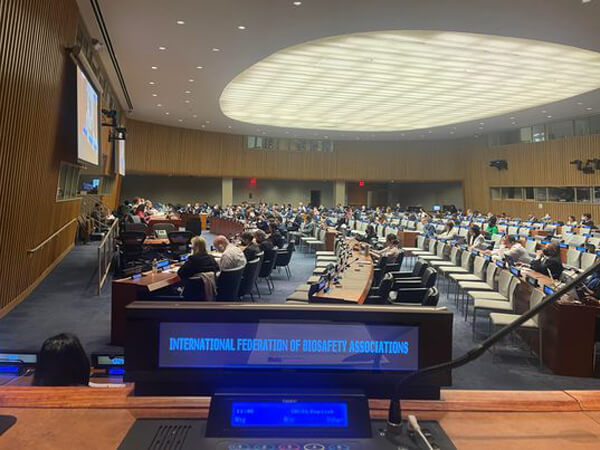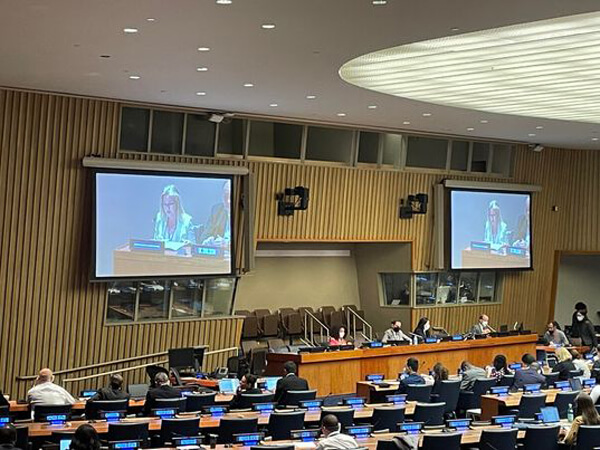Statement by Stephanie Norlock on behalf of the International Federation of Biosafety Associations to the Open Consultations of the Security Council Committee Established Pursuant to Resolution 1540 (2004) on the Comprehensive Review of the Status of Implementation of Resolution 1540 (2004)
View the video of the (4th meeting) 1540 Committee (Non-proliferation of nuclear, chemical and biological weapons) Open Consultations – General debate here.
Chair, excellencies, and distinguished delegates,
It is indeed a great privilege to be here today on behalf of the International Federation of Biosafety Associations that strives truly in support of the United Nations Security Council Resolution 1540
(2004). As science and technology continue to advance at a rapid pace, it is critical that scientists, policy- and decisionmakers, and the many professionals which surround them understand the impact of their work on regional and global biosecurity. All of those with direct and indirect contact with biological materials have roles to play in preventing the acquisition and use of biological weapons. Collective and complementary action across Member States, professional sectors, and communities is essential to effective and sustainable biological non-proliferation.
The International Federation of Biosafety Associations (IFBA) is a global community of research scientists, biosafety professionals, laboratory personnel, biotechnologists, NGOs, academics, and policymakers from around the world who clearly understand that biosafety and biosecurity are important elements within the framework of biological non-proliferation and strengthening global security. The IFBA’s mission statement (safe, secure, and responsible work with biological materials) highlights the need to protect and promote global health and security and lays the foundation for the implementation of strategies to minimize the serious dangers that can arise from the failure to implement sound biosafety and biosecurity practices and regulatory measures.
With over 45 National and Regional Member Biosafety Associations across every region of the world, IFBA draws heavily from its international community and diverse stakeholders in achieving our mission. Our task is to help ensure that all states have the requisite knowledge and tools about biosafety, biosecurity,
dual-use of concern and biological non-proliferation. We partner with local biosafety associations, national governments, regional and international organizations, and the private sector providing unique opportunities to implement locally relevant biosecurity strategies using risk- and evidence-based approaches. These efforts do not only help partnering states in fulfilling their obligations to UNSCR1540 (2004) at the national level, but also collectively support global health security and biological non-proliferation in a sustainable manner.
When looking to the future of biological disarmament and non-proliferation, it is imperative that strategies acknowledge the full spectrums of risk and implicated communities. As mentioned, it is critical that professionals across the life sciences and beyond are aware of the potential dual uses of their work or of the materials and information that they handle. The need for broader awareness is compounded by rapidly changing and emerging technologies which often surpass progress of relevant policies and legislation.
Fostering a culture of responsibility across the life sciences has been a popular issue of discussion across the biological non-proliferation community in recent years, and is a key component of successfully implementing UNSCR1540 across the world. Instilling this culture in future generations of all the stakeholders, is an important step towards successful Resolution implementation. Youth provide unique contributions to disarmament discussions and efforts around the world, including their roles in emergency response and community support. Further outreach and targeted initiatives are required to support youth involvement in discussions pertaining to biological non-proliferation to include their underrecognized contributions to Resolution implementation. As long as different groups like youth are underrepresented across formal biological non-proliferation fora, it will be difficult to fully realize the importance of sustainable actions to benefit all.
In November 2021 at the Biological Weapons Convention Meeting of States Parties, a group of young biosecurity professionals presented the Youth Declaration for Biosecurity, which IFBA promptly endorsed.
The Declaration includes recommendations such as further integration of youth leaders in global biological non-proliferation and disarmament affairs, increasing biosafety and biosecurity awareness, including dedicated education in these fields, as well as the exchange of biosecurity best practices at national and regional levels to ensure equitable capacity development. To begin implementing the Declaration, IFBA and key partners such as Masinde Muliro University are now in the processes of developing a new, dedicated undergraduate degree program in biosafety and biosecurity. With support from Global Affairs Canada, this project is to be piloted in Kenya over the next year. IFBA reiterates its support for the Youth Declaration for Biosecurity, and emphasizes its impact as a model mechanism for youth inclusion across the global security sector. We encourage Member States, IGOs, and NGOs alike to similarly consider the roles that youth play in the historical and future implementation of UNSCR1540, and how increasing inclusion may benefit national and global security in years to come.
Thank you, Chair, excellencies, and distinguished representatives.


